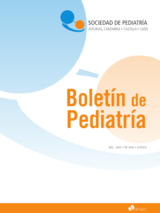Factores estresantes en progenitores de neonatos ingresados en una Unidad de Cuidados Intensivos
A. Bartolomé Ferrero , L.P. Rodríguez Rodríguez , M. González Arranz , E. Sánchez Vicente
Bol. Pediatr. 2023; 63 (264): 114 - 122
Introducción y objetivo. El estrés ocasionado por el ingreso de un recién nacido altera la dinámica y estructura de la unidad familiar. El objetivo de este estudio es analizar los factores estresantes percibidos por los padres/ madres de recién nacidos ingresados en una Unidad de Cuidados Intensivos Neonatales. Método. Estudio descriptivo transversal realizado en la Unidad de Neonatología del Hospital Universitario Río Hortega de Valladolid durante un periodo de un año. Se incluyeron a los padres/madres de recién nacidos ingresados en Unidad de Cuidados Intensivos durante más de 48 horas, obteniendo un total de 60 pacientes. Se recogieron variables sociodemográficas y clínicas de los progenitores y del recién nacido, y se aplicó la traducción y adaptación propia de la Escala de estrés parental. La participación en el estudio fue de manera voluntaria. Resultados. El nivel de estrés general obtenido para madres y padres fue entre moderado y extremadamente estresante (78,1%), siendo las madres las que mostraron niveles de estrés más elevados en los rangos superiores, con un 50% entre muy estresante y extremadamente estresante, mientras que los padres se mantuvieron en niveles moderados con un 42,4%. La subescala más afectada tras la evaluación de la Escala de estrés parental fue rol parental, concretamente el factor separación madre/padrerecién nacido (65,6% entre muy y extremadamente estresante). Encontramos significancia estadística (p< 0,021) al relacionar el nivel de estrés general con la distancia en kilómetros desde el hospital al domicilio. Conclusión. La hospitalización de un recién nacido genera estrés y ansiedad en los padres/madres alterando el vínculo afectivo.
Stress factors in parents of newborns admitted to an Intensive Care Unit
Introduction and objective. The stress caused by the admission of a newborn alters the dynamics and structure of the family unit. The objective of this study is to analyze to analyze the stressors perceived by parents of newborns admitted to a Neonatal Intensive Care Unit. Methods. Descriptive cross-sectional study carried out in the Neonatol Unit of Río Hortega University Hospital in Valladolid, during a one-year period. It included parents of newborns admitted to the Neonatal Intensive Care Unit for more than 48 hours, obtaining a total of 60 patients. Sociodemographic and clinical variables of the parents and newborns were collected and the translation and adaptation of the Parental Stressor Scale was applied. Participation in the study was voluntary. Results. The general stress level obtained for mothers and fathers was moderate to extremely stressful (78.1%), it is the mothers that show the highest stress levels in the upper ranges, with 50% of them between very stressful and extremely stressful; while fathers remained at moderate levels with 42.4%. The most affected subscale after the evaluation of the Parental Stressor Scale was the parental role, specifically the mother/father-newborn separation factor (65.6% between very and extremely stressful). The was a statistically significant association (p< 0.021) between general stress and distance from residency to hospital.
Artículo completo (PDF) (155 kb.)
- Neonatología
